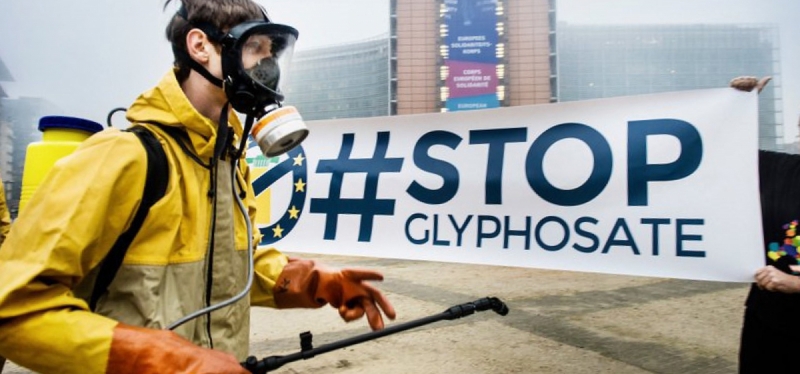While soon in Europe we will be discussing again the renewal of the glyphosate, on the other side of the Atlantic, the second Roundup cancer trial in San Fransisco’s Federal court concluded that Monsanto’s Roundup herbicide (the most popular glyphosate-based herbicide) was a substantial factor causing cancer to a Californian man.
The trial took place following the allegations of Edwin Hardeman, 70 year-old, against Monsanto, that his exposure to Roundup caused him to develop non-Hodgkin’s lymphoma (NHL), a cancer that affects the immune system. According to Mr Hardeman, he was using Roundup on his 56 acres land since 1986, and was diagnosed with cancer in 2015. One month later, the International Agency for Research on Cancer (IARC) of the World Health Organisation classified glyphosate as “probable human carcinogen”.
IARC’s scientists examined the scientific and regulatory literature and based their conclusion on “limited evidence of carcinogenicity in humans”, “sufficient evidence” in experimental animals and “strong evidence” on mechanism of toxicity such as cell and DNA damage. For humans, IARC took into account three human case studies from 3 different countries were 2592 people had developed Non-Hodgkin lymphoma following exposure to glyphosate-based herbicides.
During the trial it was revealed that Monsanto (purchased by Bayer last summer) intentionally deceived the public, the scientific community and the authorities by discrediting international cancer scientists and promoting counter messages of glyphosate safety instead. The Jury ordered Monsanto to pay roughly $80 million in damages for failing to warn Edwin Hardeman of the cancer risks of Roundup herbicide.
Last August, another glyphosate victim, Dewayne “Lee” Johnson, was awarded $78 million by another jury in California (the first ever trial on Roundup) also on findings that his use of Monsanto’s herbicides caused his non-Hodgkin lymphoma and Monsanto covered up the risks. Monsanto has appealed.
Following the IARC classification of glyphosate as probably carcinogenic Monsanto (Bayer) is facing roughly 11,000 plaintiffs all alleging that exposure to Monsanto’s Roundup herbicide and its active ingredient, glyphosate, cause non-Hodgkin lymphoma (NHL).
Moreover, just a couple of weeks ago a cancer-stricken couple that made use of Roundup was awarded $2 billion dollars by a California jury who ruled Monsanto (now Bayer) is liable to pay for failing to appropriately inform consumers of the health risks related to its products. This was the third such verdict in just under one year to order Bayer-owned Monsanto to pay damages to cancer victims over the chemical, whose active principle is the controversial substance glyphosate. The couple, Alva and Alberta Pillioid, who had contracted non-Hodgkin’s lymphoma after using Roundup, were awarded $18m in compensatory and one billion in punitive damages, as well as $37m in compensatory and one billion in punitive damages respectively. Although Bayer have already claimed they will appeal the decision, and although the damages award is likely to be reduced, the verdict still made headlines all over the world as the highest amount the company has ever faced paying.
Meanwhile, the same week the California court ruled in favour of Mr and Mrs Pillioid, it emerged in European news that during the EU decision as to whether to renew the European commercial license for glyphosate, a PR agency in Brussels working for Monsanto called Fleishman Hillard had illegally compiled a dossier of known and potential “allies” and “foes” of the company itself and its controversial product Roundup. The list, compiled in 2016 in view of the 2017 EU commercial renewal decision, was comprised of some 200 people including politicians, journalists and scientists who had raised concerns about Monsanto’s activities, as well as of public figures from the political or scientific world who instead supported the product.
The document was obtained by French newspaper Le Monde in early May. It is illegal under French law to compile information about an individual’s political and philosophical opinions without their consent; as such, the Paris prosecutor’s office announced a preliminary investigation into the collection of personal data. Bayer has apologised over Monsanto’s dossier, and also said it was hiring a law firm to contact everyone on the list about what information had been gathered.
Glyphosate was reauthorized in the EU in 2017 for a period of five years. The European Commission has recently appointed France, Hungary, the Netherlands and Sweden to be the Member State in charge (act as Rapporteur) of the next glyphosate assessment following the application for renewal and assess whether it should be banned after this period. Three years before expiry of the approval (i.e. by 15 December 2019), companies wishing to maintain the approval of glyphosate will have to submit an application for renewal.
Following the court cases in the U.S. and the increasing evidence on the toxicity of glyphosate and glyphosate-based products for humans and the environment, Bayer and other producers should consider withdrawing their products from the market. More importantly, there is an urgent need to reform the current Pesticide Authorisation system and ensure that such chemicals are not used in agriculture or management of green/urban areas.
Last week, Austria made the news headlines with an unexpectedly decisive action to hold a vote on an outright ban on July 2. Will Austria become the first EU country to ban glyphosate? What is for sure is that glyphosate will remain as a subject of a heated debate.
